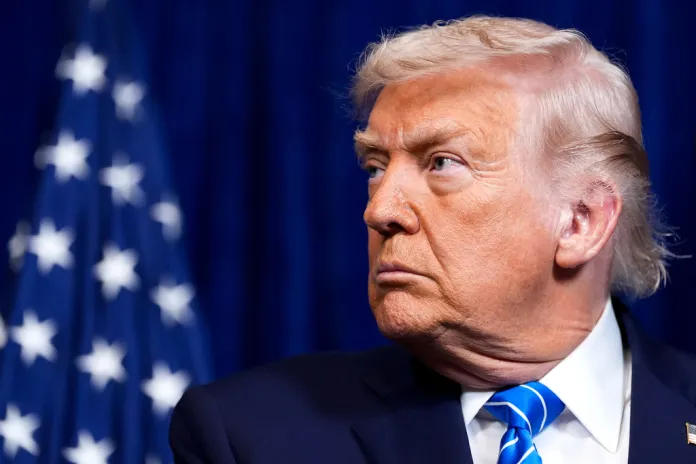Trump call to slash corporate tax rate could face populist chopping block – Washington Examiner
The article discusses President Donald Trump’s push to extend the tax cuts implemented during his first term, especially the 2017 Tax Cuts adn Jobs Act, as he anticipates a potential second term starting January 20, 2029. With concerns that the Republican Congress may not remain compliant by 2027, the extension of these cuts becomes a priority. The article highlights that while the tax cuts were criticized by Democrats as benefiting the wealthy at the expense of the middle class, they were quite popular among taxpayers.
A key feature of the 2017 tax legislation was the permanent reduction of the corporate tax rate from 35% to 21%. This rate will not change unless Congress opts to increase it or diminish it further. Current Democratic candidates, including Kamala Harris, have proposed a modest increase to 25%, which still aligns closely with global averages. Trump, on the other hand, has suggested further reducing the corporate tax rate to 15% for companies making products in America, tying any cuts to incentives for domestic manufacturing.
As the deadline for the expiration of some of these tax cuts approaches in 2026, the article emphasizes the need for legislative action to secure their continuation, reflecting the contrasting positions of Democrats and Republicans regarding corporate taxation.
Trump call to slash corporate tax rate could face populist chopping block
President Donald Trump has a long list of things he wants to accomplish in his second, nonconsecutive term and a short time to do so. He has a hard stop date of Jan. 20, 2029, and could find himself without a compliant Republican Congress by early January 2027 if the historic results of past midterm elections hold and the incumbent president’s party struggles to build on wins from the previous cycle.
A successful Trump administration 2.0 will look different depending on who’s asked. But a universal issue Republicans acknowledge they need to tackle is extending the 2017 Tax Cuts and Job Act, commonly referred to as the “Trump tax cuts” and the president’s signature domestic achievement from the last time around.
Though the law instantly came under fire by Democrats as a “tax scam” giveaway to millionaires and billionaires that left middle-class voters hurting, the cuts were a boon for most taxpayers and shifted the tax burden more toward wealthy people.
Many of the tax cuts are set to expire at the start of 2026 due to Senate budget “reconciliation” rules that allowed the legislation to make it through the Senate needing only a bare majority in the 100-member chamber rather than clearing the usual 60-vote filibuster hurdle. Senate Republicans now are planning to use the reconciliation process again in still-being-written legislation to extend the tax cut law. However, individual provisions are still up in the air.
Renewing and extending the cuts that are set to expire later in less than a year is broadly popular. Even 2024 Democratic presidential nominee Kamala Harris tacitly endorsed the proposal’s main thrust, if not some of the details. The then-vice president promised no one making more than $400,000 would see their taxes go up.
The Corporate Tax Rate Is Set In Law But Could Be Lowered Again
Mixed in with the temporary cuts in 2017 was a permanent reduction of the corporate tax rate from 35% to 21%. That figure isn’t going anywhere unless Congress decides it wants to hike it back up or lower it further. Which differentiates it from many of the other tax cuts set to go up unless Trump and Congress do something about it.
There are a few, if any, Democrats in 2025 who are arguing the corporate tax rate needs to move back to the 35% threshold. Even fierce Trump critics say some lowering was needed to make U.S. businesses more competitive internationally.
Harris argued the rate should not be renewed when she campaigned in 2019, when, as a Democratic senator from California, she unsuccessfully sought the next year’s Democratic presidential nomination. As her party’s nominee in 2024, Harris called for a corporate tax rate hike from 21% to 25% — a figure roughly in line with most peer nations though slightly higher than the global average of 23.45%.
Trump has backed away from loud calls on the 2024 campaign trail for the rate to fall further. His most detailed case for doing so came in a September onstage interview at the Economic Club of New York.
“Corporate tax revenues are 31% higher today than before my tax law was signed,” Trump said at the time. “To further support the revival of American manufacturing, my plan calls for expanded [research and development] tax credits, 100% bonus depreciation, expensing for new manufacturing investments, and a reduction in the corporate tax rate from 21% to 15% solely for companies that make their product in America.”
Rather than an across-the-board cut, Trump proposed pairing the corporate tax rate trim with revenue raised from his “beautiful” tariffs for any company that isn’t committed to propping up U.S. manufacturing.
“You have to make your product in America,” Trump continued. “If you outsource, offshore, or replace American workers, you are not eligible for any of these benefits. In fact, you will pay a very substantial tariff when a product comes in from another country that’s made in another country and comes in.”
Now, backing away from another gift to corporations might be part of an acknowledgment that it was blue-collar workers Trump poached from Democrats, rather than white shoe executives, who gave him a victory over Harris last year.
Matt Gertken, a geopolitical analyst at BCA Research, told the Washington Examiner the corporate tax rate cut created a massive vulnerability for Trump before, and playing that hand again might be problematic. Gertken cited the 2018 midterm elections, when Democrats won a House majority for the first time in eight years, effectively halting Trump’s first-term legislative agenda.
“It didn’t work well in the midterms in 2018. The tax cuts themselves were viewed as a handout to the fat cats and corporations, and it actually worked against President Trump’s populist, working-class voter appeal,” Gertken said. “I think at that time, he was really deferring to the House leadership. Not that he didn’t want tax cuts, but just that he sort of did it in a way that wasn’t necessarily viewed as populist.”
Outside of a handful of advisers, there aren’t members of House leadership who are agitating to see anything more controversial in a reconciliation bill than cutting taxes on tips and Social Security. The still-nebulous policy proposal is already on a knife’s edge due to a slim House majority and a solid but hardly overwhelming Senate 53-47 edge.
Gertken said Trump and Republicans could make the argument that a sweetener for corporations will help accelerate growth and “juice the consumer.” An argument like that might work, but it also will run up against the problem that the “gigantic” 2017 cut didn’t result in the surge in investment that was promised.
Trump’s relatively quiet change of his position on pushing for a new corporate tax cut hasn’t put him at George H.W. Bush levels of “no new taxes” pledge reversal political vulnerability. Between a fractured House Republican Conference filled with budget hawks who have already defied his debt ceiling desires once and strict Senate rules about what can be done via reconciliation, Republicans will be hard-pressed to include the corporate tax rate cut in the broader legislation widely expected to emerge. Particularly since the rate isn’t set to rise again next New Year’s Day, unlike many others.
Republicans “know they need to extend the 2017 tax cuts, but to add new tax cuts on top of that is going to be a challenge,” Gertken said.
" Conservative News Daily does not always share or support the views and opinions expressed here; they are just those of the writer."




